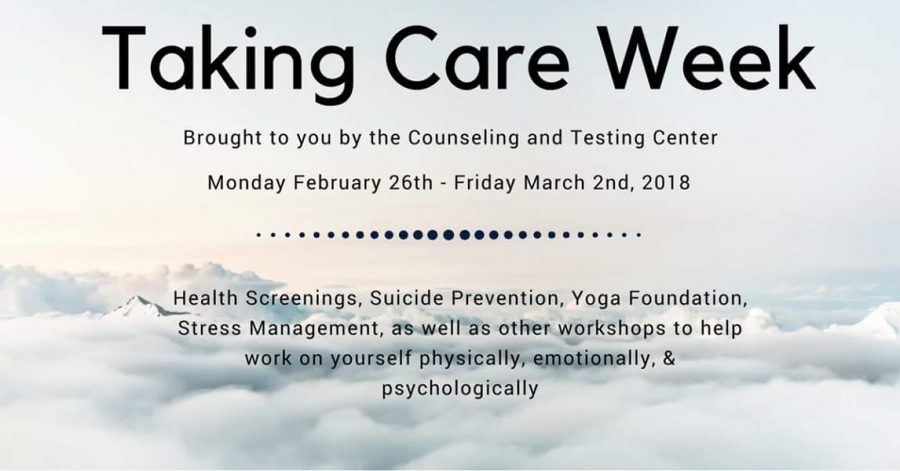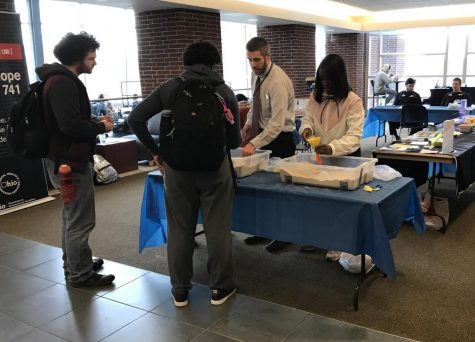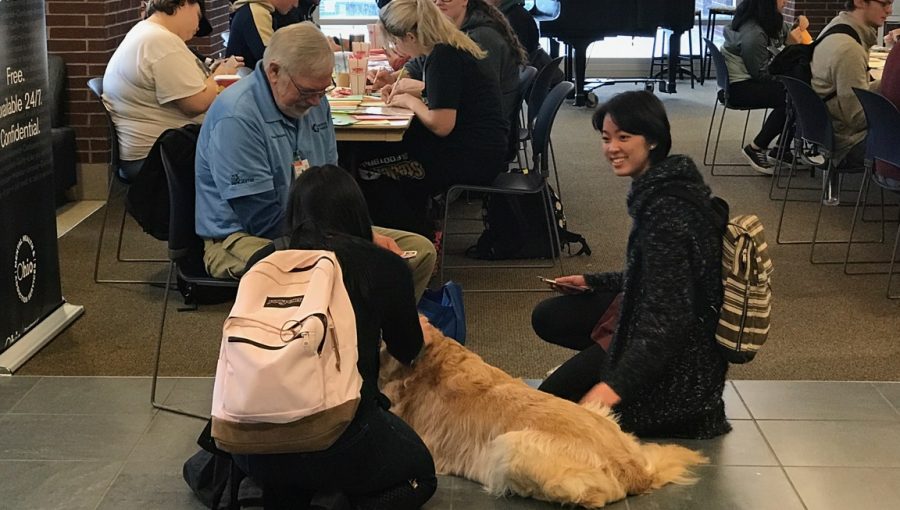Taking Care Week Offers Students, Faculty, Staff Ways to De-stress
Each spring semester, the Counseling and Testing Center hosts Taking Care Week in order to help remind people of the importance of self-care.
University students write “Get Well” cards for Akron Children’s Hospital patients and take a moment to relax with the therapy dogs.
March 5, 2018
Hosted by the Counseling and Testing Center, this year’s Taking Care Week included several activities; such as informational workshops where students, faculty and staff learned ways to de-stress and relax during midterms.
Dr. Matthew Altiere, Senior Associate Director of the Counseling and Testing Center, said they always aim to hold Taking Care Week near midterms in order to provide people with a mid-semester distraction from the stresses of college.

“I think we all struggle at times to slow down and engage in adequate self-care. This week reminds us all of the importance of taking a little time each day for self-care,” Altiere said. “So, we provide [people] with small ways for self-care… whether it is having some fresh popcorn, petting a dog, or making a stress ball.”
Altiere said the two goals for Taking Care Week were to provide some self-care services on campus and inform people of what services the Counseling and Testing Center has to offer on campus.
According to the Counseling and Testing Center’s website, this year’s Taking Care Week began Monday, Feb. 26, 2018, with a resource fair where people were able to receive information about different University departments and student organizations that offer ideas for self-care.
On Tuesday, Feb. 27, 2018, Julio Brionez and Jennifer Hardy, Psychology Interns at the Counseling and Testing Center, led a workshop called “Suicide Prevention”.
During the workshop, Brionez and Hardy discussed when stress turns from normal to problematic, various signs associated with a person’s risk of taking their life and resources available to help those people at risk.
“Suicide is a very hush-hush topic for lots of people,” Brionez said. “There’s ways to support people and to help them… [with] anything that might be troubling them. That’s what we hoped to convey with this talk today.”
Sophomore Katelyn Stewart, a human relations majors, said she attended this event in order to learn more about ways to help and to notice the signs of a person dealing with stress, depression and the risk of taking their life.
For students who were not able to attend this event, Hardy believes the most important thing to know is to seek professional help if a person feels they have too much stress in their life and may be at risk of harming themselves.
Another event for Taking Care Week was Peace, Love and Happiness, which took place Wednesday, Feb. 28, 2018. According to the Counseling and Testing Center’s website, this workshop gave people an opportunity to increase “peace, love, and happiness in their lives.”

The Counseling and Testing Center offers students the chance to craft homemade stress balls for Taking Care Week.
Freshman Johnetta Jackson, a political science major, said she attended the workshop to see what methods they offered. Jackson said the most important thing she learned was “obtaining peace and happiness is a lot easier than expected. It’s not about finding [them]: it’s about maintaining [them].”
On Thursday, March 1, 2018, a workshop called “LGBT Ally/Safe Zone Training” enabled people to become allies for others who may feel as though they are apart of a marginalized or minority group, Brionez said.
During this workshop, Brionez and Psychology Intern Samantha Goodin, from the Counseling and Testing Center, discussed various topics within the main idea of being an ally to the LGBTQ community.
“The importance of it, in relation to Taking Care Week, is that some folks who either identify with marginalized or minority identities don’t have the space or the support that other people have,” Brionez said. “So this training enables… people to take [better] care of one another.”
Goodin said this workshop helps explain ways to think about “gender and sexual orientation…, [a person’s] own privileges they’ve had or not had and biases they may have grown up with.”
According to the Counseling and Testing Center’s website, Taking Care Week ended with the “Future Self Fair” where students could receive different ideas on preparing their career path and life.
Additional events offered during Taking Care Week were making “Get Well” cards for Akron Children’s Hospital patients, a stress management fair, and Summa WagTime with therapy dogs.
“We plan on continuing Taking Care Week each year, so continue to look out for it around midterm time during each Spring semester,” Altiere said.












